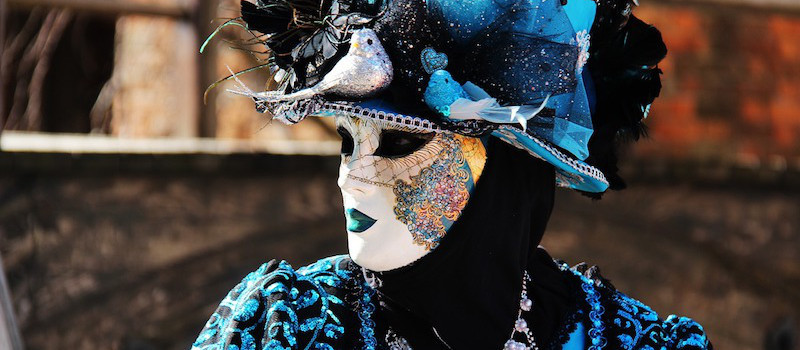
19 Feb
Italian carnival masks: a brief history
Carnival is one of the most famous celebrations in the world. Officially linked to the Christian tradition and influenced by the liturgical calendar of the Catholic Church, it has very ancient roots. We remember for example the Dionysian feasts of Greece, where the god Bacchus (Dionysus, who has many aspects in common with the figure of Jesus Christ) was celebrated, or the Saturnalia, in the ancient Roma.
However, in the Middle Ages we have the first evidence of the term “carnevale” or “carnevalo” which in its etymology corresponds to the practice of not eating meat during Lent, the forty days before Easter.
In fact, Carnival seems to be a fusion of carnem levare, remove the meat, even if this is not the only translation that has been found (see for example “carnuali – country games” or “carrus navalis – ship on wheels”, like the floats used for the typical carnival parades). Carnival originally meant the last banquet before the beginning of Lent, on Shrove Tuesday Martedì Grasso in Italian. By extension, later, the whole period dedicated to the celebrations was precisely called carnival.
A curiosity: the carnival, dotted with masks and disguises, typical of the theater, was actually experienced by the actors and theater companies as a moment that anticipated a dark period: immediately after it, during Lent, public performances were in fact prohibited. For this reason the purple color, typical of the liturgical vestments of Lent, is said to bring bad luck if worn on the stage!
About masks. We said that at carnival people dress up, and we all know this. A highly accredited hypothesis, along with many others, derives the etymology of “mask” directly from “masca”, in Latin, a way of saying witch. What is important to say is that masking is a practice already established in prehistoric times, and is deeply linked to the evolution of man and collective rites. The mask, in fact, from the very beginning, was used to put the human world in communication with that of spirits. Having a mask meant losing one’s identity and identifying with another entity, that of a god, who took possession of it and spoke through it. The meaning of the mask has gradually changed over time, used in the Hellenic world as a figurative instrument to attribute characteristics to the characters of one’s theater (and as a sounding board, as it amplified the acoustics of the voices) or worn prank by the ancient Romans, which we do today too.
Traditional Italian carnival masks
The fame of the masks that we want to present to you today, a small number compared to the real one, is mainly due to the tradition of the Commedia dell’Arte, also known abroad as Italian Comedy, born in the sixteenth century and acclaimed until the mid-eighteenth century.
Arlecchino
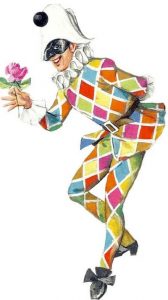
Perhaps the best known mask of all, Arlecchino is a servant from Bergamo, shrewd and joker. His features are a fusion between Zanni from Bergamo and other diabolical figures on the French scene. Harlequin, we must say, is in fact a little Devil. His very name resembles Alichino, a demon who was also in Dante’s hell and who, together with others, tortured the damned with boiling pitch. In the Commedia dell’Arte, Harlequin loses his diabolical traits anyway and turns into a fun and lively servant, the emblem of the poor, unfaithful to his master and a cheat. Arlecchino expresses himself in dialect, he is a gluttonous bread-eater and he is in love with Colombina!
Pulcinella
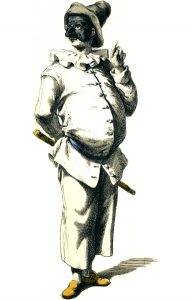
As we know it, his mask was born in Naples in the early 1600s, but of course, and like all of them, it has almost archaic origins. It would even find its roots in the Atenelle, a type of show in vogue in Ancient Rome. Like its appearance, his name has changed over the years, and we can find it under Policinella or Pollicinella. Lazy, ironic, cheeky and chatty servant, even Pulcinella would do anything to steal a plate of macaroni.
Balanzone

Doctor Balanzone, also known simply as “the doctor”, is the iconic mask of Bologna. His name is ironic, a misrepresentation of “balance”, scales, a symbol of law and justice. With him we move from the world of servants, to catapult us into that of gentlemen, even if his character is not as nice: he is serious, pedantic and quirky, and the public has less chance to empathize with him. His costume is that of a university professor (eighteenth century), with toga, hat, jacket and cloak.
Pantalone
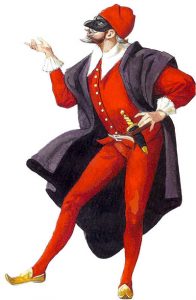
The Venetian Pantalone was born around 1500 and is a merchant, old, stingy and dominated by vice and lust. At the beginning of his fortune, he was portrayed as a comic and farcical. As his mask treads the scenes, he becomes the symbol of the gruff and stingy father of the Borgese drama. We often find him accompanied by his wife, the beautiful daughter Rosaura whom so many court and the astute servant Colombina. The origins of its name are curious and we like, among the accredited theories, the one that makes it derive from Plant-Lion, that is the gesture of the soldiers and merchants to plant the banner of Venice – precisely the lion of San Marco – in all the territories (including passionate ones) that he conquers.
Meneghino
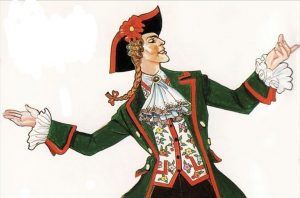
We at ELLCI who live in Milan cannot fail to mention the Milanese mask par excellence, Meneghino. Indeed, we will tell you more, we often use the adjective “meneghino” as a “milanese”. He is a sincere and honest character – how could it be otherwise? – and in fact, unlike all the other characters, he does NOT wear a mask (because he has nothing to hide?!). Meneghino, on the stages of which he was the protagonist, took on the role of servant, peasant, master and merchant and in all roles he is always in search of justice!
Rugantino

He is a Roman bully, and his very name derives from “ruganza”, arrogance. But we mustn’t be too hard on him, because behind the rough skin of his mask, there is actually a good heart. He has a quarrelsome nature, he is histrionic but entertains anyone who meets him.
Capitan Spaventa
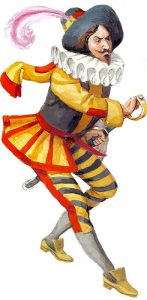
We end with Capitan Spaventa, the Ligurian soldier. He is cultured and has a tender and dreamy soul, in spite of the name he bears. His common sense guides him towards shores of wisdom and we often find him in contrast to another, less positive mask: that of the arrogant Captain Matamoros.
What are the best known masks in your country? Write to info@ellci.it to tell us!
